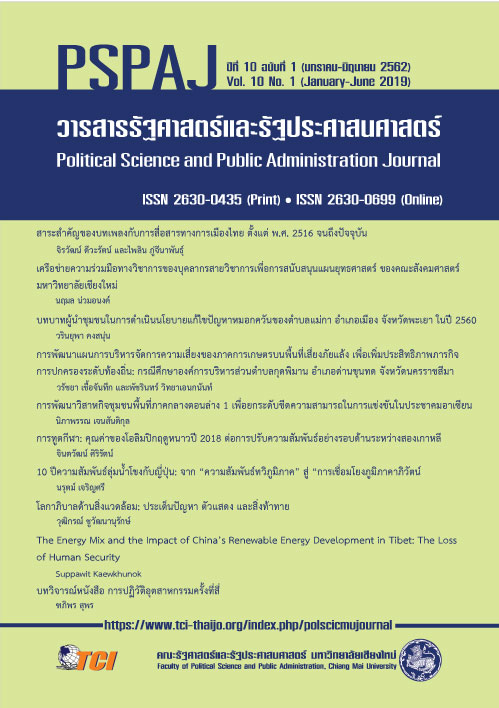The Community Leader’s Roles in Implementing Smog Problem Policy in Maeka Sub-district, Muang, Phayao in 2017
Main Article Content
Abstract
This article investigates community leaders’ roles in and obstacles to solve smog problem in Maeka Sub-district, Muang District, Phayao Province. This research also provides solutions to these difficulties. Key informants of the study are the heads of eighteen villages in Maeka Subdistrict, two villagers of each village (36 villagers), and eight representatives of eight public organizations (Muang District Office, Maeka Sub-district Municipality Office, the Royal Forest Department, the Royal Thai Army, Phayao Provincial Office for Natural Resources and Environment, Phayao Land Development Station, Maeka Sub-district Health Promoting Hospital, and the University of Phayao).
According to in-depth interviews, the community leaders solved smog problem by using wire broadcasting and conducting community meetings. Although villagers cooperated with the leaders to solve the problem,
there were some difficulties. Firstly, the leaders lacked the budget for improving wire broadcasting and allocating wages to volunteers to prevent bushfire. Secondly, the leaders could not make those who caused smog aware of effects of smog problem. Thirdly, villagers were not active enough to discuss how to solve the problem concretely. Finally, the leaders did not strictly enforce community agreements on preventing smog, because of their fear of conflict with villagers. According to solutions to these problems, the leaders should raise villagers’ awareness to collectively solve smog problem throughout the year. The government should sufficiently allocate budget to the community leaders. Moreover, to avoid conflict between
the leaders and villagers, the government should urge the leaders to enforce the law, rather than the community agreements on preventing smog.
Downloads
Article Details
- เนื้อหาและข้อมูลที่ลงตีพิมพ์ในวารสารรัฐศาสตร์และรัฐประศาสนศาสตร์ถือเป็นข้อคิดเห็นและความรับผิดชอบของผู้เขียนบทความโดยตรง ซึ่งกองบรรณาธิการวารสารรัฐศาสตร์และรัฐประศาสนศาสตร์ ไม่จำเป็นต้องเห็นด้วย หรือร่วมรับผิดชอบใดๆ
- บทความและข้อมูล ที่ได้รับการตีพิมพ์ในวารสารรัฐศาสตร์และรัฐประศาสนศาสตร์ ถือเป็นลิขสิทธิ์ของวารสาร หากบุคคลหรือหน่วยงานใดต้องการนำข้อมูลไปใช้ประโยชน์ในทางวิชาการ ขอให้อ้างอิงแหล่งที่มาด้วย
References
กรมควบคุมมลพิษ. (2560). แผนปฏิบัติการป้องกันและแก้ไขปัญหาหมอกควันภาคเหนือ. กรุงเทพฯ: กระทรวงทรัพยากรธรรมชาติและสิ่งแวดล้อม.
กรมอุทยานแห่งชาติ สัตว์ป่า และพันธุ์พืช. (2560). ยุทธศาสตร์/มาตรการแก้ไขปัญหาไฟป่าและหมอกควันปี 2560. กรุงเทพฯ: กระทรวงทรัพยากรธรรมชาติและสิ่งแวดล้อม.
กรรณิการ์ ทาอินทร์. (2553). บทบาทของผู้นำชุมชนต่อการกำหนดนโยบายการพัฒนาท้องถิ่นองค์การบริหารส่วนตำบลแม่เจดีย์ใหม่ จังหวัดเชียงราย. (การศึกษาค้นคว้าแบบอิสระรัฐศาสตรมหาบัณฑิต). มหาวิทยาลัยเชียงใหม่.
คณะทำงานจัดทำแผนปฏิบัติการแก้ไขปัญหาไฟป่าและหมอกควัน จังหวัดพะเยา. (2560). แผนปฏิบัติการแก้ไขหมอกควันปี 2560. กรุงเทพฯ: กระทรวงทรัพยากรธรรมชาติและสิ่งแวดล้อม.
สำนักงานจังหวัดพะเยา. (2559, 2 ธันวาคม). เรื่อง มาตรการแก้ไขปัญหาหมอกควันและไฟป่าจังหวัดพะเยา ประจำปี 2560. ประกาศจังหวัดพะเยา. สืบค้นเมื่อ 8 กรกฎาคม 2560, จาก www.facebook.com/pg/www.maejai.go.th/photos/?tab=album&album_id=1450834278283919
สำนักงานจังหวัดพะเยา. (2560, 27 มกราคม). เรื่อง มาตรการ 60 วันอันตราย งดเผาเด็ดขาดเพื่อลดผลกระทบต่อประชาชนในช่วงสถานการณ์หมอกควันปกคลุม. ประกาศจังหวัดพะเยา. สืบค้นเมื่อ 10 กรกฎาคม 2560, จาก www.libarts.up.ac.th/v2/Manager/img/News/STOP_Wildfire.pdf
เทศบาลตำบลแม่กา. (2560, พฤษภาคม). ข้อมูลพื้นฐานเทศบาลตำบลแม่กา. สืบค้นเมื่อวันที่ 4 กันยายน 2560, จาก www.maekalocal.com
ธิดารัตน์ พัฒนโพธิ์, และชนินทร์ วะสีนนท์. (2560). ความคาดหวังของประชาชนต่อบทบาทของสมาชิกสภาเทศบาลตำลกุดไห อำเภอกุดบาก จังหวัดสกลนคร. วารสารบัณฑิตศึกษา, 14(64), 141-148.
พิชาภพ พันธุ์แพ. (2554). ผู้นำกับการจัดการการเปลี่ยนแปลง. กรุงเทพฯ: สำนักพิมพ์แห่งจุฬาลงกรณ์มหาวิทยาลัย.
ศูนย์อำนวยการแก้ไขปัญหาหมอกควันและไฟป่าจังหวัดพะเยา. (2560). คู่มือการงดเผาเพื่อการแก้ไขปัญหาหมอกควันและไฟป่า. พะเยา: สำนักงานทรัพยากรธรรมชาติและสิ่งแวดล้อม.
อรทัย ยะมะโน. (2556). บทบาทผู้นำท้องถิ่นต่อการแก้ไขปัญหายาเสพติดในอำเภอปาย จังหวัดแม่ฮ่องสอน. (การค้นคว้าแบบอิสระรัฐประศาสนศาสตรมหาบัณฑิต). มหาวิทยาลัยเชียงใหม่.
Mintzberg, H. (2006). Developing leaders? Developing countries?. Development in Practice, 16(1), 4-14.


